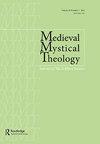Saint Bonaventure and the Divine Order of Creation
IF 0.3
0 RELIGION
引用次数: 0
Abstract
ABSTRACT One of the most interesting controversies of the thirteenth century arose over the Aristotelian conception of time. Aquinas and Bonaventure took two different approaches to this question of time. Bonaventure took an eschatological view of time which refuted the Aristotelian notion of formless time which Aquinas seems to have accepted. Taking a more emanationist view of creation than Aquinas, Bonaventure sought to link historical time to a sacred unfolding of the divine mystery, symbolically presented in the Genesis account of creation. This sacred unfolding of time has powerful affinities with the stages of mystical ascent portrayed in his Itinerarium Mentis in Deum and the De Reductione Artium ad Theologiam. History, although ultimately hidden from human understanding, nevertheless for Bonaventure can be seen as a refinement and transformation of the creation into the mind of God where all things will be made new. This essay explores the mystical aspects of this Franciscan vision of history as contemplated by Bonaventure.圣博纳文图拉与神圣的创造秩序
摘要十三世纪最有趣的争论之一是亚里士多德的时间观。阿奎那和博纳文图拉对这个时间问题采取了两种不同的方法。博纳文图拉对时间持末世论观点,驳斥了阿奎那似乎已经接受的亚里士多德关于无形式时间的概念。博纳文图拉对创造的看法比阿奎那更为发散,他试图将历史时间与神圣之谜的神圣展开联系起来,这在《创世纪》对创造的描述中具有象征意义。这种神圣的时间展开与他在《Deum》和《De Reductione Artium ad Theologiam》中描绘的神秘上升阶段有着强大的亲缘关系。历史,虽然最终隐藏在人类的理解之外,但对博纳文图拉来说,可以被视为创造物向上帝心灵的提炼和转变,在那里一切都将变得全新。本文探讨了博纳文特尔所设想的方济各会历史观的神秘方面。
本文章由计算机程序翻译,如有差异,请以英文原文为准。
求助全文
约1分钟内获得全文
求助全文

 求助内容:
求助内容: 应助结果提醒方式:
应助结果提醒方式:


